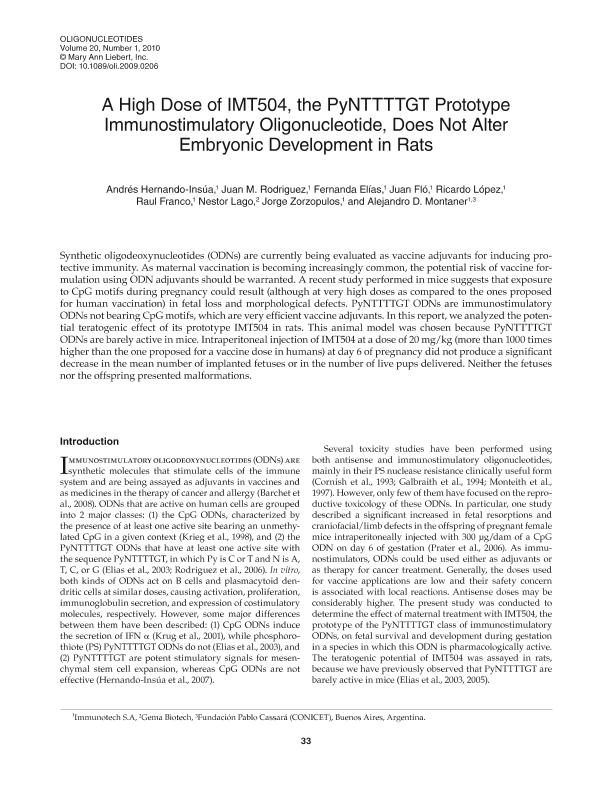Mostrar el registro sencillo del ítem
dc.contributor.author
Hernando Insúa, Andrés
dc.contributor.author
Rodriguez, Juan M.
dc.contributor.author
Elías, Fernanda
dc.contributor.author
Fló, Juan
dc.contributor.author
López, Ricardo
dc.contributor.author
Franco, Raul
dc.contributor.author
Lago, Nestor
dc.contributor.author
Zorzopulos, Jorge

dc.contributor.author
Montaner, Alejandro Daniel

dc.date.available
2019-01-29T20:22:59Z
dc.date.issued
2010-02
dc.identifier.citation
Hernando Insúa, Andrés; Rodriguez, Juan M.; Elías, Fernanda; Fló, Juan; López, Ricardo; et al.; A high dose of IMT504, the PyNTTTTGT prototype immunostimulatory oligonucleotide, does not alter embryonic development in rats; Mary Ann Liebert; Oligonucleotides; 20; 1; 2-2010; 33-35
dc.identifier.issn
1545-4576
dc.identifier.uri
http://hdl.handle.net/11336/68917
dc.description.abstract
Synthetic oligodeoxynucleotides (ODNs) are currently being evaluated as vaccine adjuvants for inducing protective immunity. As maternal vaccination is becoming increasingly common, the potential risk of vaccine formulation using ODN adjuvants should be warranted. A recent study performed in mice suggests that exposure to CpG motifs during pregnancy could result (although at very high doses as compared to the ones proposed for human vaccination) in fetal loss and morphological defects. PyNTTTTGT ODNs are immunostimulatory ODNs not bearing CpG motifs, which are very efficient vaccine adjuvants. In this report, we analyzed the potential teratogenic effect of its prototype IMT504 in rats. This animal model was chosen because PyNTTTTGT ODNs are barely active in mice. Intraperitoneal injection of IMT504 at a dose of 20 mg/kg (more than 1000 times higher than the one proposed for a vaccine dose in humans) at day 6 of pregnancy did not produce a significant decrease in the mean number of implanted fetuses or in the number of live pups delivered. Neither the fetuses nor the offspring presented malformations.
dc.format
application/pdf
dc.language.iso
eng
dc.publisher
Mary Ann Liebert

dc.rights
info:eu-repo/semantics/openAccess
dc.rights.uri
https://creativecommons.org/licenses/by-nc-sa/2.5/ar/
dc.subject
Pynttttgt Odn
dc.subject
Oligonucleotides
dc.subject
Toxicity
dc.subject.classification
Otras Biotecnologías de la Salud

dc.subject.classification
Biotecnología de la Salud

dc.subject.classification
CIENCIAS MÉDICAS Y DE LA SALUD

dc.title
A high dose of IMT504, the PyNTTTTGT prototype immunostimulatory oligonucleotide, does not alter embryonic development in rats
dc.type
info:eu-repo/semantics/article
dc.type
info:ar-repo/semantics/artículo
dc.type
info:eu-repo/semantics/publishedVersion
dc.date.updated
2019-01-29T18:07:58Z
dc.journal.volume
20
dc.journal.number
1
dc.journal.pagination
33-35
dc.journal.pais
Estados Unidos

dc.description.fil
Fil: Hernando Insúa, Andrés. Immunotech; Argentina
dc.description.fil
Fil: Rodriguez, Juan M.. Immunotech; Argentina
dc.description.fil
Fil: Elías, Fernanda. Immunotech; Argentina
dc.description.fil
Fil: Fló, Juan. Immunotech; Argentina
dc.description.fil
Fil: López, Ricardo. Immunotech; Argentina
dc.description.fil
Fil: Franco, Raul. Immunotech; Argentina
dc.description.fil
Fil: Lago, Nestor. Gema Biotech; Argentina
dc.description.fil
Fil: Zorzopulos, Jorge. Immunotech; Argentina. Consejo Nacional de Investigaciones Científicas y Técnicas; Argentina
dc.description.fil
Fil: Montaner, Alejandro Daniel. Immunotech; Argentina. Consejo Nacional de Investigaciones Científicas y Técnicas. Oficina de Coordinación Administrativa Parque Centenario. Instituto de Ciencia y Tecnología "Dr. César Milstein". Fundación Pablo Cassará. Instituto de Ciencia y Tecnología ; Argentina
dc.journal.title
Oligonucleotides

dc.relation.alternativeid
info:eu-repo/semantics/altIdentifier/doi/http://dx.doi.org/10.1089/oli.2009.0206
dc.relation.alternativeid
info:eu-repo/semantics/altIdentifier/url/https://www.liebertpub.com/doi/10.1089/oli.2009.0206
Archivos asociados
